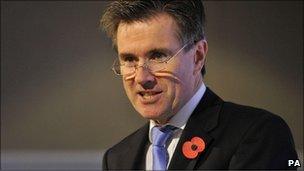MI6 chief Sir John Sawers' secrecy balancing act
- Published

Sir John Sawers is cut from a different cloth to his predecessor as head of MI6
How secret does a secret service need to be? That's the question MI6, like its sister services MI5 and GCHQ in Britain, as well as more distant relatives abroad, has been wrestling with. The man known as "C" - Sir John Sawers - has offered his answer.
In the Cold War, MI6 did not exist. At least not officially. Government officials and ministers were trained to avoid saying anything about it.
Even within the narrow confines of Whitehall, MI6 officers would work "undercover" and turn up to meetings with name badges which hid their true work.
But the strictures of the Cold War have passed away and with the modern world has come a greater demand from the public for transparency and accountability from all institutions, including those that spy in their name.
MI6 chiefs have slowly been edging out into the light. Sir John Sawers' predecessor, Sir John Scarlett, went as far as being interviewed by the BBC for a Radio 4 documentary marking the centenary of MI6.
But he held back from the TV cameras, perhaps reflecting a career working on the front line in places like Moscow.
Media ease
Sir John Sawers is cut from a different cloth. He joined MI6 at the start of his career but quickly transferred over to the Foreign Office where he eventually occupied a number of high-profile posts including ambassador to the UN.
That gave him an unusually high profile and ease with the media when he took over as head of MI6 a year ago.
But wider trends have also contributed to the unprecedented step of appearing before the bright lights of the TV cameras. The arrival of terrorism has done more than anything to take MI6 out of the shadows.
Was there any warning of the Bali bombings or the 7/7 bombings in London, it has been asked? Why should we tolerate tighter security at our airports? These are questions the public wants answered.
Politicians have also turned to intelligence to help explain their actions - in Iraq the consequences were disastrous, inflicting a heavy toll on MI6's reputation.
The other great strain has come from the allegations of complicity in torture. The accusation has never been of direct participation in torture but rather an uncritical relationship with partners who sometimes employ unsavoury methods.
Urgent priority
Sir John tried to address that, carefully arguing that MI6 would receive intelligence from partners and act on it to save lives even if it did not always know how that information was produced.
But it would not take any action itself which would lead to torture, even if that allowed terrorists to continue their work. Instead, other methods - consistent with human rights - would be sought to foil their work.
The distinctions are carefully drawn and subtle but still not altogether clear. Critics will argue from one perspective that this stance is not doing enough to protect British lives and that the intelligence game is all about working along difficult moral terrain.
Others will say the rules are not tight enough and accepting intelligence from those who might torture will encourage them to continue.
Pressure from the courts and lawyers to release information has forced British intelligence to reveal more than it would have liked and, with its defences breached, going on the offensive and speaking more publicly to defend itself has become a more urgent priority.
But Sir John was also careful to make clear the limits of openness. MI6 depends on secret agents willing to betray secrets. Any suggestion their identities might be exposed would make them less willing to spy for Britain and work with MI6.
Being able to tackle the threats the country faces depends on secrecy, Sir John argued. But just how much secrecy is required and where the boundaries should lie will remain a matter of debate inside MI6 as well as outside.
- Published28 October 2010
- Published6 July 2010